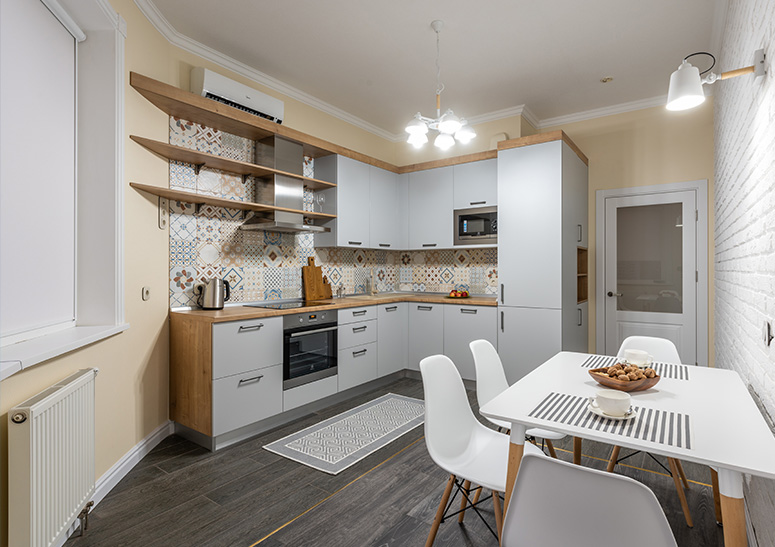Energy saving tips for Property owners and landlords
Saving energy is important to reduce environmental impact and lower energy costs. There are many ways to save energy, and everyone can do their part. Even by making small changes in our daily lives and using energy-efficient appliances and technologies, we can achieve significant savings while protecting the environment.
To begin with, there are a few basic, general tips that everyone can implement in their everyday lives:
- Don’t put devices on standby: All electronic devices that you are not be used should be switched off completely. This refers to things like. Computers, televisions, chargers and even lights. By turning off these devices when they are not in use, you can realize significant savings. achieve. It’s especially convenient if you use smart wired switch systems with voice control, as they allow you to turn off and turn on the relevant devices at once. and turn them on again at once.
- Energy-efficient lighting and appliances: There are many energy-saving lamps and energy-saving appliances that consume less energy than their standard counterparts. By using these devices and lights, you can save energy and save money at the same time.
- Air conditioning and heating: By setting the thermostats to an appropriate appropriate temperature, you can save energy while keeping your home comfortable.
- Washing machine and dryer: By waiting until you have enough laundry, to wash or dry a full load, you can save energy. Using lower temperatures can also help save energy.
How can landlords reduce electricity costs and save energy?
The topic of energy saving, on the other hand, is becoming more exciting and strategically decisive for real estate owners and landlords: Saving energy is important to reduce costs and at the same time reduce environmental impact. Property owners and landlords have a special responsibility in this context, as they are responsible for a large proportion of energy consumption in Germany. To meet this demand, there are some tips that can help save energy.
- Electricity from renewable energies: These include, for example, solar thermal energy, photovoltaics or heat pumps. These technologies make it possible to cover part of the energy demand by using natural resources. For example, the use of solar thermal energy can provide hot water. Photovoltaic systems make it possible to generate electricity from solar energy. Heat pumps use heat stored in the environment to heat the building.
- Energy-saving lighting: Energy-saving lighting, such as LED lights, can help reduce energy consumption. Controlling lighting via motion sensors or timers can also help save energy.
- Maintenance of heating and ventilation systems: Regular maintenance allows the systems to be optimally adjusted, which in turn helps to reduce energy consumption. Cleaning ventilation pipes and ducts is also important to ensure optimal air circulation.
How can landlords save energy by reducing heating costs?
Heating costs are an important factor for landlords and tenants alike. While tenants often struggle to keep their heating costs within budget, landlords can help reduce these costs through clever measures.
- Thermal insulation: Insulating the walls, roof and floor can keep a lot of heat in the building, which means less energy is needed to keep the building warm. There are also different types of insulation materials that landlords can use, such as mineral wool, Styrofoam, and foam. Landlords should make sure they choose the best material for their building to achieve the best possible thermal insulation.sie das beste Material für ihr Gebäude wählen, um die bestmögliche Wärmedämmung zu erzielen.
- Energy-saving heating systems: This can be the use of heat pumps, solar thermal systems, or even heat pumps based on renewable energy sources such as solar energy or air heat. These types of heating systems can help reduce energy costs while minimizing environmental impact.
- Improve building insulation: Poor insulation can cause heat to escape, which means more energy is needed to keep the building warm. Landlords should ensure that their buildings are well insulated and that all windows and doors are well sealed to minimize heat loss.
- Programmable thermostats: These devices allow landlords to precisely control and program heating times and temperatures. This allows them to ensure that the heating only runs when it is really needed, and not necessarily when no one is home. This can help reduce heating costs by using less energy.
- Heat recovery systems: These systems allow heat that escapes during ventilation to be recovered and used to heat the building. This can help reduce heating costs, as less energy is needed to keep the building warm.
So there are very many ways landlords can save on heating costs. These include installing insulation, using energy efficient heating systems, improving building insulation and windows, using programmable thermostats, and using heat recovery systems. Landlords should take the time to research and implement the most appropriate measures for their building to reduce heating costs while minimizing environmental impact.
Note: The content of this article does not constitute business, legal or tax advice. Please consult a professional advisor if you have any questions.


